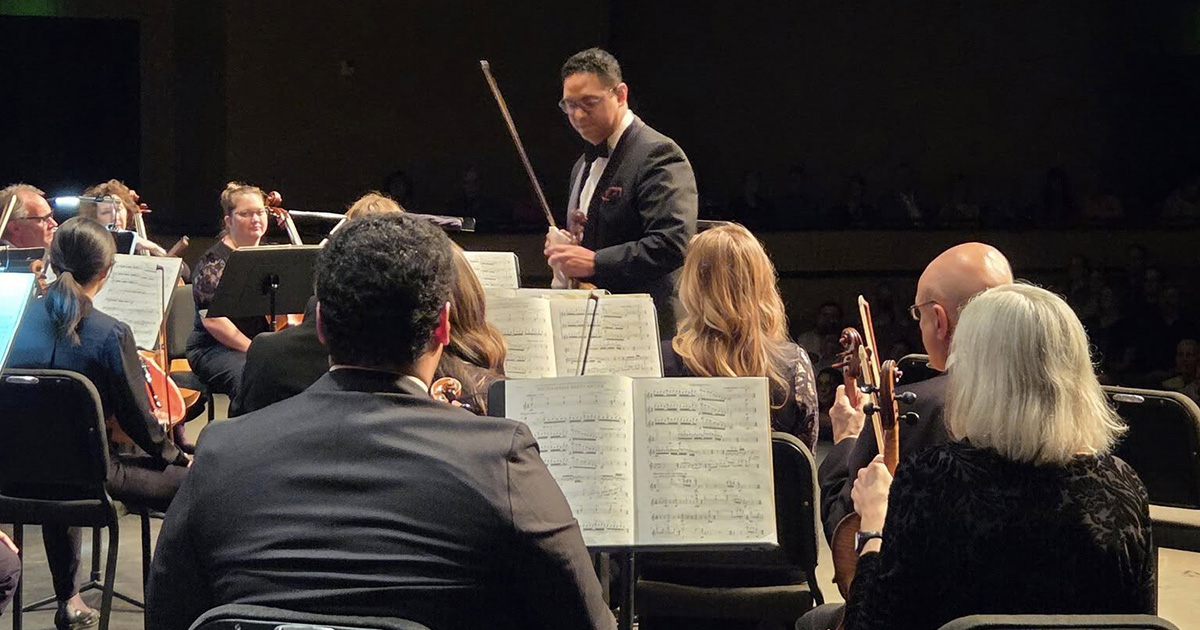Artistic collaborations come in different shapes and sizes, but none have been more visibly impactful recently in the Knoxville area music community than one this past weekend that offered a performance of Ludwig van Beethoven’s sublime Ninth Symphony—not in Knoxville, but in Maryville at the Clayton Center for the Arts on the Maryville College campus. Featured was a collaboration between Knoxville Opera and the Oak Ridge Civic Music Association with the involvement of four notable soloists, the Knoxville Opera Chorus, the Oak Ridge Chorus, and the Pellissippi State Variations Choir, with ORCMA conductor Régulo Stabilito on the podium. Since performances of Beethoven’s Ninth are often scheduled for celebratory occasions, the fact of ORCMA’s milestone 80th season seems a legitimate reason to tackle Beethoven’s symphonic masterpiece.
While collaborations are celebratory by their very nature, there were probably legitimate reasons for ORCMA to have selected a less daunting work than the Beethoven. The symphony’s depth, expected tempos, complexity, mood, and intrinsic need for ensemble precision push it beyond the reach of many organizations. In the category of ensemble togetherness, one had only to peruse the Oak Ridge orchestra’s roster in the evening’s program to see at least seven orchestra sections led by a “Guest Principal,” something that speaks volumes about the possible ensemble issues in doing justice to the work. Having said that, the assembled OR players rose to the occasion and offered a surprisingly acceptable performance that glossed over tentativeness and avoided serious mishaps.
Overall, Stabilito’s phrasings felt a bit mechanical, although the ebb and flow of ensemble balance between strings and winds that is at the heart of Beethoven’s orchestration worked as one expected. The Adagio movement—the third movement in the Beethoven’s Ninth—had moments of true tranquility and focus, although a definite pathway through those moments seemed to vanish in the haze of unfocused passages.

The highlight of the evening—as one would expect—was the Finale movement as the combined choruses and quartet of soloists got right to work. Although the introduction of the “Ode to Joy” theme by the low strings could have used a bit more delineation, there was plenty of umph in the choral forces, forces obviously well prepared by Christy Lee (Knoxville Opera Chorus), Sarah Henrich (Oak Ridge Chorus), and Meagan Humphreys (Pellissippi State Variations). Admittedly, the hall acoustics were a bit unkind to choral diction, at least at my seat location, quite an ironic turn of events given the prominence of the Schiller text. The evening’s soloists—soprano Tori Patricia Franklin, mezzo-soprano Hannah Shea, tenor Ben Gulley, and bass Kevin Burdette—were simply terrific both in their solo passages and in their ensemble moments. Burdette dispatched his with the expected fire and drama.
Although the Beethoven Ninth didn’t really need an opening number, Gabriela Lena Frank’s 2019 work, Pachamama Meets an Ode, was included to open the evening and make a tonal contrast. The work, inspired by the Ninth, used the same orchestral complement as the Beethoven (without the soloists), but relied on a varied scheme of instrumental colors in describing an imagined meeting between Beethoven and an artist painting in a Peruvian church. With climate change as its anvil and the exploitation of natural resources as its hammer, the work mixed late Classical era tonalities with 21st Century dissonance reflecting how the message of the Ninth has been used historically for both good and evil.
A second performance of the two works followed the Maryville concert on Sunday evening at the Oak Ridge Performing Arts Center.







